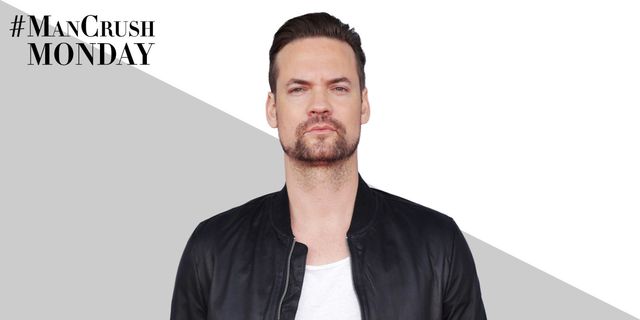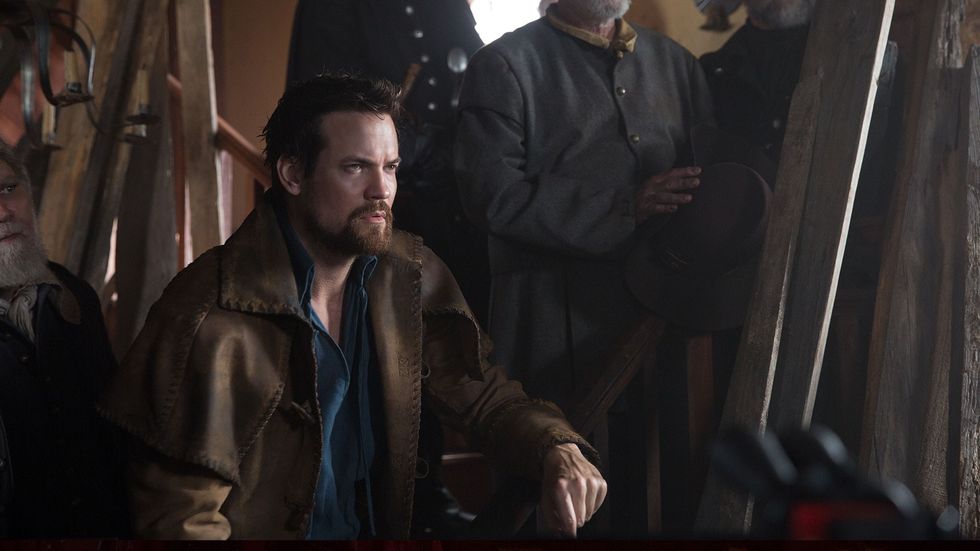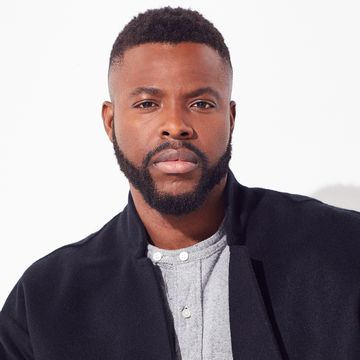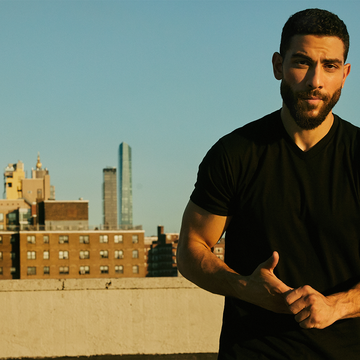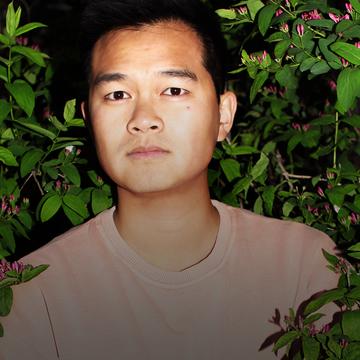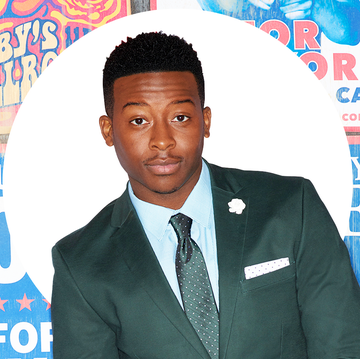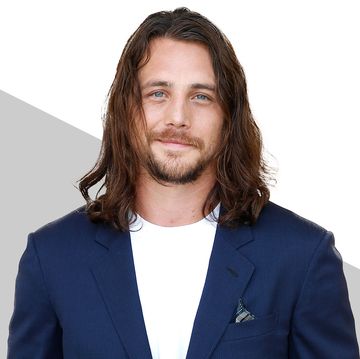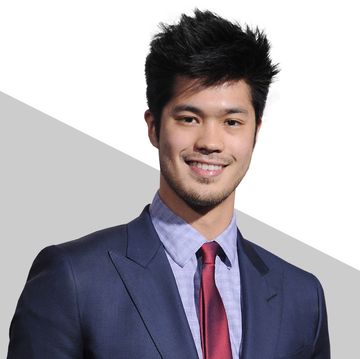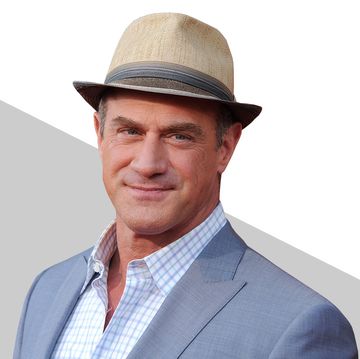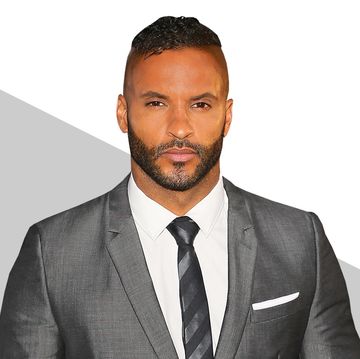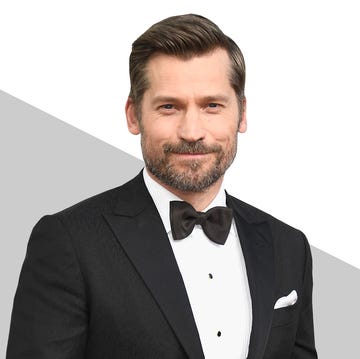One of the most enduring icons of millenial youth is the Tiger Beat poster—sleepover decor wasn't complete without a dozen or so of them plastered to the host's bedroom wall. One of the faces most often depicted on those posters was that of Shane West, who stole many a pre-teen heart as Landon Carter in A Walk to Remember opposite Mandy Moore. Fifteen years later, West's name still invokes sepia-toned memories of a pre-The Notebook childhood crush. But the 38-year-old actor would be unrecognizable in the early-aughts North Carolina of Nicholas Sparks's imagination. Today, he can be found defending colonial America from supernatural predators as Captain John Alden on Salem, WGN's blood-soaked reimagining of the witch trials as a front for cavorting with the devil and other occult practices. West, an admitted horror fiend, remembers receiving the script three years ago: "Nothing like it was on TV; nothing like it had been written this way," he says. "It's fun to be able to introduce characters that were real human beings from that time period and put our twist on it." Below, West discusses the parallels between the witch trials and today's society, revisiting A Walk to Remember and the under-the-radar role that turned his career into a globe-hopping music gig:
Harper's Bazaar: Tell me about working on Salem—what drew you to the show? Did you have an interest in the time period before?
Shane West: What really drew me to the show was the theme, or genre, and how well this particular show was written. I was just finishing up Nikita; we knew we were on our final season and we were all looking for new jobs, and Salem dropped into my lap. I'm a big horror fan—thrillers, scary movies, scary TV shows—and this was the first opportunity that had fallen into my lap that had given me that chance. For me it was pretty much a no-brainer.
I was not a big fan of that time period, I knew a little bit about that Salem Witch trials from high school, but I really liked the idea of basing it on fact and turning it into historical fiction and switching the end game: "What if the witches were real? What if they actually were running the witch trials and condemning innocent people to death?" I thought that was a very unique twist on our American history. Any time you can make historical fiction, it can be a little more fun because you can play with things and change things and get away with it. Even some of the smallest characters that have come and gone in three seasons—sometimes a co-star or a guest star—a lot of those characters were based off real people from the time.
HB: When you're going through the scripts, do you ever notice similarities between their society and ours? Witch hunts in the age of social media, for example?
SW: I think Brandon [Braga] and Adam [Simon], our creators of the show, are well aware of social implications and what's going on in society as each season has come out. I think they've sometimes added bits of that on purpose and sometimes it's just happened organically. You'll see in Season 3, there's a whole storyline based on refugees, and because we filmed this season in the winter and spring of 2016, it wasn't written on purpose to mirror what was happening around the world and in the United States, but I love that it's socially conscious in a way and also staying true to what really was happening in that time period. That's really what was happening. It wasn't the United States; it was a bunch or towns and a bunch of cities, to use the term loosely, that were trying to be united but didn't really know what to do and were afraid of all the quote-unquote "evils" out in the world, [like] wild animals, disease, etc., and were afraid to help other people because they were trying to help themselves. It's suddenly mirroring our election right now. It's certainly a unique time in our current American history, so it's kind of a nice escapism to get away and do our somewhat fictional take on it.
HB: You mentioned you're a horror fan, and the show gets a little graphic—and terrifying—at points. What was your favorite scene to film so far?
SW: That's one of the more difficult questions to answer, only because in three seasons, there's not one episode that goes by that I don't do something that's intriguing or fun. There's always something exciting. This year, in Season 3, there's going to be what we called "the revenant": a fight scene which, if you've watched up to now, the second episode, the militia that I'm leading to protect the town of Salem from the French and the Indians, you'll see me and the militia fight a pretty epic battle scene against the undead Native American tribes attacking the town, which turns into a zombie version of the revenant. Everyone I shoot down with an arrow or chop down with an axe, they keep coming back. It's kind of our Evil Dead take on that. That was a two-day shoot. It took two days to film it all because we wanted to make it worthwhile. It's amazing what's gonna make it to air because there's so much that was edited out, and it still looks great. I think it was a six-minute scene minus the edit, so unfortunately I think they had to chop it down to two or three. That has to be one of my favorite scenes. But what I love about the horror and thriller element is I like to go to set and watch the other actors do the crazy things that have nothing to do with my character. Just to see how they're gonna pull that off. Every episode it's like, how the hell are we gonna one-up this one?
HB: Horror is fun because actors get to try things outside of their comfort zones.
SW: Oh yeah! What's weird is [horror] goes directly into my comfort zone, but for the other actors on the show it's definitely more difficult. I have been very fortunate so far—I'm probably screwing myself for saying this in an interview—but I'm not a big bug fan. And they're everywhere. And creatures and animals and familiars are everywhere on this set. But probably because my character is not a witch, I have been able to avoid having them all over me. Those are some of the things I am not very interested in and I've been blessed to not have to deal with.
HB: Switching gears, A Walk to Remember's 15th anniversary is coming up in January. How do you look back on that time in your life?
SW: [Laughs] It's hard! So much time has gone by. You know, it was a great period of time being that young—I believe I was 23, 24—and social media hadn't become a big thing, which I think was a blessing, honestly, at least for me. The film industry hadn't taken a hit yet. People were still going to movies every week—and were able to afford to go to movies every week. It was kind of the beginning of the end of how we know the TV and film world to be. Things were still very loose, very happy and very honest.
Adam Shankman, the director, pulled us aside and said, "Hey look, worst case scenario: if no one goes to see this movie, just know that all of you have put together some solid performances, some powerful performances, and we put together a great little love story." And that's all you could kind of ask for. We did not expect the success of the film and that was something that was a wonderful surprise. At that point I had done a couple of teen films and I was already on a TV show called Once and Again; the two films hadn't really performed but the TV show was really well-respected. When I went into A Walk to Remember, Mandy Moore was more of a face and a name than I was. I was sort of like, "Hey, you know what? If this movie fails, I don't know if it's on me!" [Laughs] It was that whole thing of trying to relax and be sarcastic through extraordinary circumstances such as this acting business. But the movie happened to take off and we were really proud of it. And I think what's exciting about it even to this day is that it seems to continue to garner a new audience constantly, sort of like The Notebook.
I feel like those two, out of all of them—I don't even know how many Nicholas Sparks films there are—seem to stand out the most to people. And that's important, the modern-day love story, and hey, if it stuck around this long, hopefully it'll continue to stick around. It was a wonderful experience. I love that this anniversary is coming back. It kind of brought Mandy and I back together, at least in the sense of talking often—not like we were ever not friendly, it's just that life goes on. And with the success of her new show, This Is Us, and Salem airing our third season, it's given us even more of a reason to chat every day. Janet Montgomery, the lead actress on Salem, has now got a recurring [role] on This Is Us, and Milo Ventimiglia, Mandy Moore's love interest on This Is Us, is an old friend of mine. He and I did our first job together way back in the day.
HB: You've been in the industry a long time—so have Mandy and Milo—so what's your take on the rise of long-form television and being a part of that, especially with movies moving to the back burner right now?
SW: I love being a part of the industry at the age that I'm currently in, to be able to witness all this. When I started, when Mandy started, when Milo started, we started at a time when film and television had always been the same—film was always the thing. Television was where you made money—where some actors retired, where soap operas were killing it every day, just sweeping up the ratings—and films were where a lot of theatrical actors wanted to go. It was such a competitive time, but everyone had a chance to audition. I had opportunities to go in for lead roles in movies with no background and fight for them legitimately. And have directors go, "You know what? We kind of like Shane." "Are you gonna hire him?" "No." "But he's just a kid, maybe he'll turn out to be something one day." And that's kind of how the business always was. It was so much—I sound like an old man now—but so much better then. Now, if you're brand new and trying to act, you can't even get an audition because all sorts of famous movie actors decided to do television.
It's killed the middle man—that's the negative thing about it all—and I feel bad for some people and some of my friends. Films feel like they'll always be here because we love them, but that $30 million to $40 million movie that used to be such a big part of the industry feels like it's slowly going the way of the buffalo. I don't know if that's a good thing. I don't think it is—I miss it—but we all as actors don't have the chance to play a Wolverine in the next movie. We'd love to, but they're not looking at us at all. They're looking at whatever might be the hottest thing at that exact moment. Then it's just independents that are really not independents! They're phenomenally made like The Revenant and cost a ridiculous amount of money to make. That's not an independent! That's not an independent at all! But it'll be looked at that way. There's nothing in the middle now. So what is the middle? It's television, and I think that's a wonderful medium that we can give back to the audience, especially with Netflix, Hulu and streaming. You get it all at once. I think that's what helped Stranger Things become such a big, cultural phenomenon. It just took the world by storm.
HB: What else are you watching right now?
SW: Mr. Robot, I need to see—I still haven't seen that and I'm friends with Rami [Malek]—and that's embarrassing because that's a couple seasons out. I've been doing very well, believe it or not, of catching up with a lot of things. I'm caught up on Game of Thrones, Ray Donovan, The Walking Dead, House of Cards, I'm almost done with Black Mirror—those are usually the shows that I truly love.
HB: You're a huge music fan. I quickly want to talk about What We Do Is Secret, in which you played the Germs frontman Darby Crash. You've stated in previous interviews that it's your favorite role. You actually toured with the Germs after working on the movie. What's it like to play someone onscreen, then step into their shoes and take their place onstage, in real life?
SW: What We Do Is Secret, playing Darby Crash, was really a dream come true. I know for every actor and actress, it gets hardcore at that point. You've committed to playing it—it doesn't need to be a musician, it can be a poet, a politician, anyone that is a real person, a well-known person—and you know you have to not screw this up. This just so happened to be in the music world that I happened to like. I wasn't big on the LA punk rock scene, I was more the New York CBGBs and the British Invasion, the Sex Pistols, Clash-type scene, but it's essentially the same. [The movie] got me into the world I had always loved.
We ended up doing this interview years ago with Swindle magazine, and the reporter said, "Shane, how does it feel to be the only person that has ever joined the band after doing one of these type of biopics?" And I remember being shocked in the moment. We were sitting outside, getting ready to play a show—because I had become a real part of the band—and I had said, "Wait, maybe that is true!" Val Kilmer was so good in The Doors movie, you just assumed he could've easily taken over if he wanted to. It was a really good feeling. The punk rock world is really underground. A lot of people to this day still don't know I did that movie, but we toured the world for five years—longer than that band was around their first go-round—and got to get the band out of Los Angeles. They never left Southern California. I got to experience stuff as a fan, meeting people like Ian McKay from Minor Threat, Joan Jett, being able to do Warped Tours, opening for Rancid—which I was a big fan of growing up—and [the Germs band members] Pat [Smear] and Lorna [Doom] and Don [Bolles] got to tour around the world and see what their peers and what the kids thought of their music that had never played live outside of Los Angeles. And it really kinda brought Pat Smear and Dave Grohl from the Foo Fighters back together and reunited their relationship. Now Pat is a full-time member of the Foo Fighters again.
HB: If you had to choose one, would it be music or acting?
SW: Well there's nothing better than being live and uncut onstage and getting that immediate gratification, whether you did a good job or whether you didn't—you'll hear it immediately. There's something about that rush that you don't get on film or television. But that being said, it's hard. I try and do both. I used to say if I had a crystal ball and I was able to see my future and it said, "You can be happy, successful and comfortable at either, you can choose," then I might have to choose music. There's a little bit more freedom with that. You're writing your own stuff, if it's rock and roll, and there's something a little bit more medicating in that way. If you haven't conformed to a label's wishes or requests and you've been able to be successful on your own, with the music that you're writing, then how could that not be better than anything else?
This interview has been edited and condensed for clarity.

Julie Kosin is the senior culture editor of ELLE.com, where she oversees all things movies, TV, books, music, and art, from trawling Netflix for a worthy binge to endorsing your next book club pick. She's the former director of audience strategy and entertainment at HarpersBAZAAR.com. When not glued to her laptop, she can be found taking pictures of her dog or haunting used bookstores.
